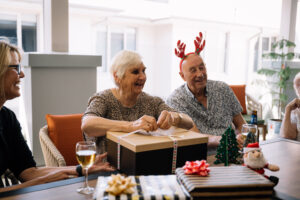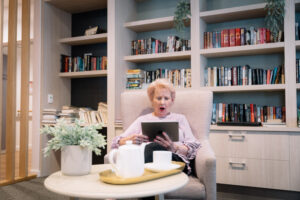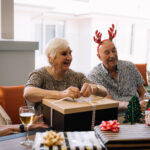Pneumonia is a relatively common and sometimes fatal infection of the lungs – it can be viral, bacterial or fungal. When someone contracts pneumonia the air sacs of the lungs become inflamed and can fill with fluid that prevents normal air flow and results in difficulty breathing. It is able to be spread by inhaling droplets in the air (such as from the cough or sneeze of someone with the infection) or develop after having a cold or the flu.
Anyone at any stage of life can be affected by pneumonia, however after the age of 65 the risk of contracting pneumonia is higher. As we age, our immune system becomes weaker and our bodies have to work much harder to fight off infection, even for those who lead healthy, active lives. Those who are smokers, Indigenous Australians and people with medical conditions such as cancer, diabetes or a chronic disease also have increased risk of developing pneumonia.
The symptoms of pneumonia vary from one person to the next but may include chest pain, cough, shortness of breath, difficulty breathing, confusion, fatigue and fever. If you are caring for a senior who is having difficulty recovering from a cold or the flu, please seek urgent medical assistance. Symptoms of potential pneumonia should not be ignored.
If it is suspected that your elderly loved one has pneumonia, the doctor will most likely undertake blood tests and a CT scan or chest x-ray in order to confirm the diagnosis. Doctor’s orders for recovery will include adequate rest, nutrient rich food and plenty of fluids. Antibiotics or antiviral medication may be prescribed depending on the type of pneumonia, as well as over the counter medications to treat symptoms such as fever and pain.
Prevention of pneumonia in the elderly is the best cure, so to lower their risk elders and their caregivers should endeavour to do the following:
- Wash hands frequently with soap and water
- Avoid others who are sick with cold and/or flu
- Practise good oral hygiene to minimise the risk or infections
- Ensure the home environment is kept clean of dust, mildew and mould
- Stay healthy – don’t smoke, get plenty of rest, eat well and take regular exercise.
- Get vaccinated for pneumococcal pneumonia
Being aware of the signs and symptoms of pneumonia will improve the likelihood of our elders receiving the correct medical treatment early and making a speedy recovery.
If you would like to arrange a visit to one of our homes please contact us here.






